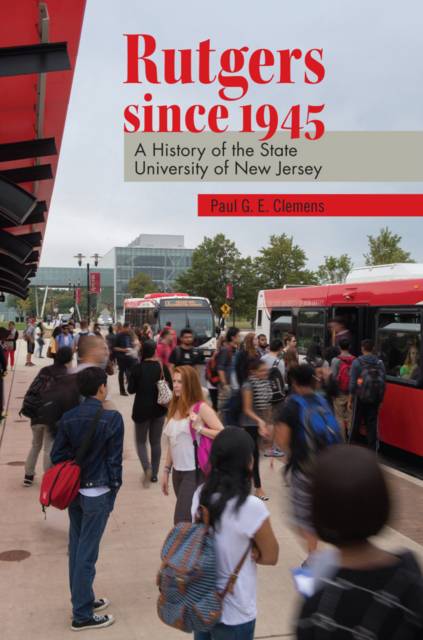
- Retrait gratuit dans votre magasin Club
- 7.000.000 titres dans notre catalogue
- Payer en toute sécurité
- Toujours un magasin près de chez vous
- Retrait gratuit dans votre magasin Club
- 7.000.000 titres dans notre catalogue
- Payer en toute sécurité
- Toujours un magasin près de chez vous
48,95 €
+ 97 points
Description
In the 1940s, Rutgers was a small liberal arts college for men. Today, it is a major public research university, a member of the Big Ten and of the prestigious Association of American Universities. In Rutgers since 1945, historian Paul G. E. Clemens chronicles this remarkable transition, with emphasis on the eras from the cold war, to the student protests of the 1960s and 1970s, to the growth of political identity on campus, and to the increasing commitment to big-time athletics, all just a few of the innumerable newsworthy elements that have driven Rutgers's evolution. After exploring major events in Rutgers's history from World War II to the present, Clemens moves to specific themes, including athletics, popular culture, student life, and campus dissent. Other chapters provide snapshots of campus life and activism, the school's growing strength as a research institution, the impact of Title IX on opportunities for women student athletes, and the school's public presence as reflected in its longstanding institutions. Rutgers since 1945 also features an illustrated architectural analysis, written by art historian Carla Yanni, of residence halls, which house more students than at any other college in the nation. Throughout the volume, Clemens aims to be balanced, but he does not shy away from mentioning the many conflicts, crises, and tensions that have shaped the university. While the book focuses largely on the New Brunswick campus, attention is paid to the Camden and Newark campuses as well. Frequently broadening the lens, Clemens contextualizes the events at Rutgers in relation to American higher education overall, explaining which developments are unique and which are part of larger trends. In celebration of the university's 250th anniversary, Rutgers since 1945 tells the story of the contemporary changes that have shaped one of the most ethnically diverse universities in the country.
Table of Contents
1 Becoming a State University: The Presidencies of Robert Clothier, Lewis Webster Jones, and Mason Gross2 Rutgers Becomes a Research University: The Presidency of Edward J. Bloustein3 Negotiating Excellence: The Presidencies of Francis L. Lawrence and Richard L. McCormick4 Student Life5 Residence Hall Architecture at Rutgers: Quadrangles, High-Rises, and the Changing Shape of Student Life, by Carla Yanni6 Student Protest7 Research at Rutgers8 A Place Called Rutgers: Glee Club, Student Newspaper, Libraries, University Press, Art Galleries9 Women's Basketball10 Athletic Policy11 Epilogue
Table of Contents
1 Becoming a State University: The Presidencies of Robert Clothier, Lewis Webster Jones, and Mason Gross2 Rutgers Becomes a Research University: The Presidency of Edward J. Bloustein3 Negotiating Excellence: The Presidencies of Francis L. Lawrence and Richard L. McCormick4 Student Life5 Residence Hall Architecture at Rutgers: Quadrangles, High-Rises, and the Changing Shape of Student Life, by Carla Yanni6 Student Protest7 Research at Rutgers8 A Place Called Rutgers: Glee Club, Student Newspaper, Libraries, University Press, Art Galleries9 Women's Basketball10 Athletic Policy11 Epilogue
Spécifications
Parties prenantes
- Auteur(s) :
- Editeur:
Contenu
- Nombre de pages :
- 368
- Langue:
- Anglais
- Collection :
Caractéristiques
- EAN:
- 9780813564210
- Date de parution :
- 04-08-15
- Format:
- Livre relié
- Format numérique:
- Genaaid
- Dimensions :
- 157 mm x 243 mm
- Poids :
- 771 g







